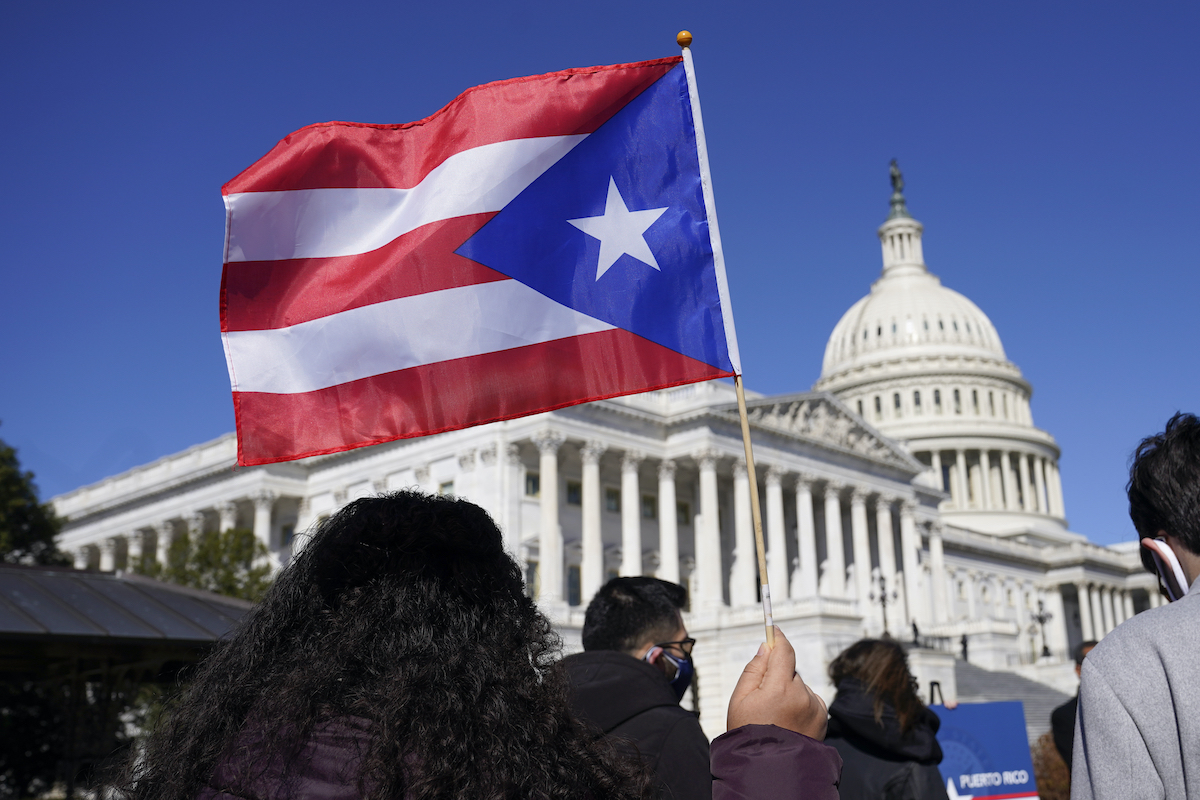

AP Photo/Patrick Semansky
Almost exactly five years after Hurricane María forever changed the lives of millions of Puerto Ricans, Hurricane Fiona provided another devastating reminder this month of just how fragile Puerto Rico’s infrastructure remains.
President Donald Trump’s tossing of a roll of paper towels into a crowd of survivors in 2017 was a thoughtless, cruel joke, but one that accurately captures an even more troubling reality: The U.S. government still views those who live in Puerto Rico and other U.S. territories as second-class citizens. Today, almost 125 years after the United States first acquired overseas territories, the status of the 3.6 million people who live in five U.S. territories —98 percent of whom are people of color— continues to be defined by a colonial framework established by a series of racist, Supreme Court cases from the early 1900s known as the Insular Cases.
The Supreme Court now has a historic opportunity to begin taking apart that colonial framework by turning the page on the Insular Cases and the legal precedent that has perpetuated these systemic biases—and it should.
Next month, the Supreme Court will consider whether to take up Fitisemanu v. United States, a case that asks whether people born in U.S. territories even have a right to U.S. citizenship and “whether the Insular Cases should be overruled.” Justice Sonia Sotomayor recently criticized the Insular Cases as being “premised on beliefs both odious and wrong,” with Justice Neil Gorsuch declaring they “rest on a rotten foundation.”
The Court should seize this opportunity to overrule these abhorrent decisions, which were fundamentally grounded in white supremacy.
The failed response after Hurricane María is just one instance in a long list of injustices suffered by Puerto Ricans and other residents of U.S. territories. The national media attention the disaster garnered brought renewed awareness to others in the U.S. and the world to the systemic discrimination and legal doctrines rooted in white supremacy that continue to be inflicted on millions of people who are part of the U.S. This “separate and unequal” structural racism is legally enshrined in the Insular Cases, which referred to the inhabitants of U.S. territories as “half-civilized,” “savage,” and “alien races.”
The same Justices who established this colonial Insular Cases framework are most infamous for their ruling a few years earlier in Plessy v. Ferguson, which created the “separate but equal” doctrine of racial segregation similarly grounded in white supremacy. The Supreme Court’s actions overruling Plessy in Brown v. Board of Education set the stage for dismantling Jim Crow and de facto racial segregation.
Now, by overruling the Insular Cases, the Supreme Court can help begin the process of dismantling the racist colonial structures it helped create. It is time the Insular Cases join Plessy in the dustbin of history.
A full democracy would allow its people to hold their leaders accountable for failures like Maria through the political process. But residents of U.S. territories are unable to vote for president, have no voting representation in Congress, and continue to be denied their right to self-determination. Territories in the Pacific have the highest rate of military enlistment in America. Puerto Ricans have been awarded the Medal of Honor, and yet none of them can vote for their commander-in-chief.
The way that the people of U.S. territories are treated is simply incompatible with America’s most basic democratic and constitutional principles. Congresswoman Stacey Plaskett, who represents the U.S. Virgin Islands as a non-voting delegate, drew this contrast in stark terms: “The ramifications of the Insular Cases go well beyond the ability of citizens in the territories to vote. We pay billions of dollars in federal taxes, and yet residents of U.S. territories are denied access to crucial federal support.”
If the Supreme Court does not act now when given a rare opportunity to move past the Insular Cases, it is unclear when, if ever, it will have another chance.
Hurricanes and natural disasters will remain a fact of life for people in Puerto Rico and other territories, but the denial of basic constitutional, democratic, and human rights and the perpetuation of colonialism on U.S. soil can no longer be accepted. Both liberal and conservative Supreme Court Justices have now acknowledged that the colonial status quo in Puerto Rico and other territories is “odious” and “rotten.”
It is time for the rest of the Court —and the rest of the United States— to do the same.
***
Lourdes Rosado is the president and general counsel of LatinoJustice PRLDEF, formerly known as the Puerto Rican Legal Defense and Education Fund, a civil rights organization based in New York. Twitter: @rosadocivrights



[…] Source link #Hurricanes #Dont #Discriminate #Puerto #Ricans #Remain #Separate #Unequal #OPINION […]
Because of the Senate. It allows welfare mooching white trash MAGAts to have power over real hard working Americans.
The Supreme Court far right majority is full trust fund babies who legislate from the bench & never worked hard in their lives. Pretty soon they’re going to make ruling that not only hurt minorities but creates actual threat to National Security.